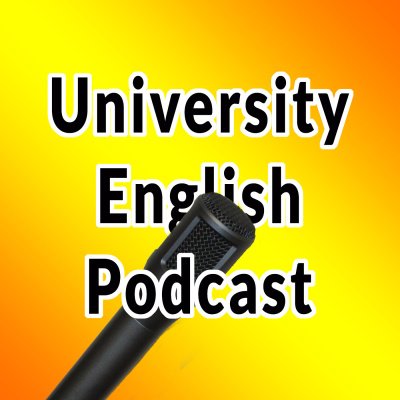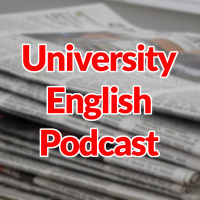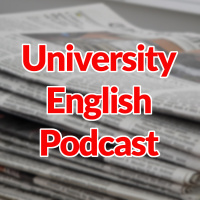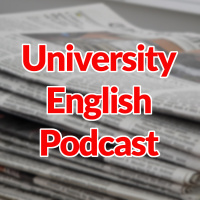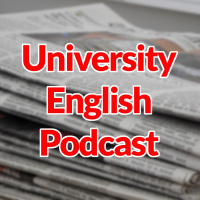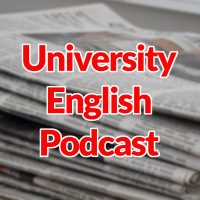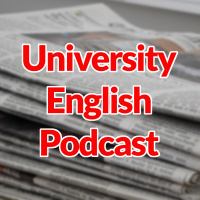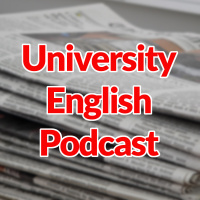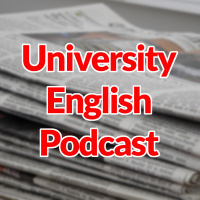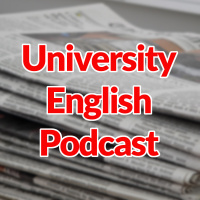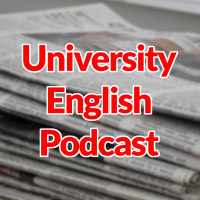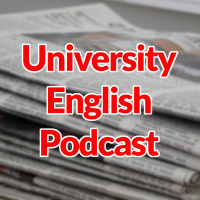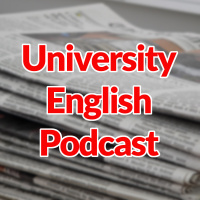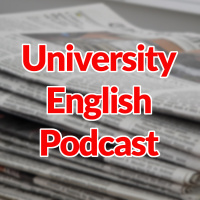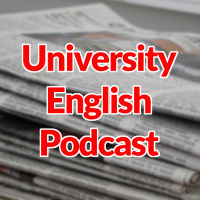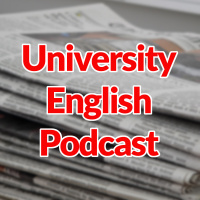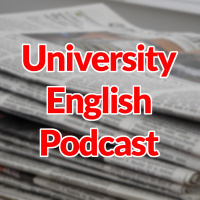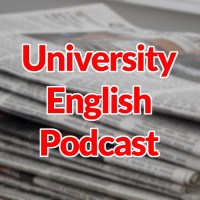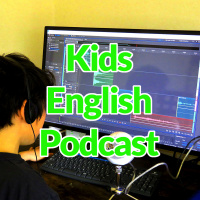Synopsis
A podcast in English for and by university students, which began in Japan. Podcasts cover a wide range of themes and topics, including academic subjects such as finance and Japanese culture and history.
Episodes
-
In the News, June 24th, 2021
24/06/2021 Duration: 04minThis is a podcast which picks up a few interesting things that have appeared in the news in recent weeks. This week we have stories in health, the animal kingdom and history. In our first story on health, we learn that dogs may be a great help to us during the corona virus pandemic. You can read more about it here: https://www.theguardian.com/world/2021/may/24/faster-than-pcr-test-dogs-detect-covid-coronavirus-london-bmj In our second story on the animal kingdom, we discover how sharks find their way around in the ocean, and you can read more by following this link: https://www.theguardian.com/environment/2021/may/17/sharks-earth-magnetic-field-gps-guidance-system In our final story on history, we hear how microbes have helped to clean some of Michelangelo’s most beautiful statues. Read about it here: https://www.nytimes.com/2021/05/30/arts/bacteria-cleaning-michelangelo-medici-restoration.html?searchResultPosition=1 Worksheet Answers: C 2. A 3. D © Martin Parsons, 2021
-
In the News, May 27th, 2021
27/05/2021 Duration: 05minThis is a podcast which picks up a few interesting things that have appeared in the news in recent weeks. In this episode we have two stories on world news and one on the environment. In world news, we hear a very scary story about a tourist bridge collapsing in China. You learn more about this story here: https://www.theguardian.com/world/2021/may/10/china-tourist-bridge-glass-panels-smash-longjing-city In the environment, we discover that the Earth’s stratosphere is getting smaller. You can learn more about this frightening story here: https://www.theguardian.com/environment/2021/may/12/emissions-shrinking-the-stratosphere-scientists-find And finally, in world news learn about a young boy who has gone from being homeless to being a Chess master. Read about this inspiring story here: https://www.goodnewsnetwork.org/tanitoluwa-adewumi-refugee-chess-champion-national-master/ https://www.nytimes.com/2021/05/08/opinion/sunday/homeless-chess-champion-tani-adewumi.html Worksheet Answers: B 2. B 3. D © Mart
-
In the News, April 22nd, 2021
22/04/2021 Duration: 06minThis is a podcast which picks up a few interesting things that have appeared in the news in recent weeks. This week we have three stories related to the ocean. In our first story, we hear about a walrus that went to sleep and ended up in … Ireland. You can read more about it here: https://www.theweathernetwork.com/ca/news/article/walrus-falls-asleep-on-arctic-iceberg-ends-up-in-ireland In our second story, we learn about a very unusual animal which can replace its entire body. You can read more about it here: https://www.nytimes.com/2021/03/08/science/decapitated-sea-slugs.html https://mainichi.jp/articles/20210308/k00/00m/040/140000c https://mainichi.jp/english/articles/20210309/p2g/00m/0li/061000c In our final story, we learn that there is large scale fraud in the seafood business. Read about it here: https://www.theguardian.com/environment/2021/mar/15/revealed-seafood-happening-on-a-vast-global-scale Worksheet Answers: D 2. B 3. D © Martin Parsons, 2021
-
In the News, February 26th, 2021
26/02/2021 Duration: 05minThis is a podcast which picks up a few interesting things that have appeared in the news in recent weeks. This week we have stories in science, world news and the environment. In our first story, we hear about a strange bear attack in the USA. You can read more about it here: https://www.theguardian.com/us-news/2021/feb/19/alaska-woman-outhouse-attacked-bear In our second story, we discover that NASA has named an important crate on Mars after a small village in Bosnia - Herzegovina, and you can read more by following these links: https://theconversation.com/how-did-nasas-martian-rover-come-to-land-in-a-crater-named-after-a-tiny-balkan-village-155740 https://www.jpl.nasa.gov/news/nasa-mars-mission-connects-with-bosnian-town In our final story, we learn that batteries for cars which can be recharged in five minutes are being developed. Read about it here: https://www.theguardian.com/environment/2021/jan/19/electric-car-batteries-race-ahead-with-five-minute-charging-times Worksheet Answers: C 2. A 3. B
-
In the News, February 11th, 2021
11/02/2021 Duration: 05minThis is a podcast which picks up a few interesting things that have appeared in the news in recent weeks. This week we have three stories about animals. In our first story, we learn about a tiny chameleon in Madagascar. You can read more about it here: https://www.theguardian.com/environment/2021/feb/05/seed-sized-chameleon-madagascar-world-tiniest-reptile In our second story, we discover that naked mole rats have different “accents”, and you can read more by following this link: https://www.smithsonianmag.com/smart-news/naked-mole-rats-speak-dialects-unique-their-colony-180976908/ In our final story, we try to understand why wombats have square-shaped poo. Read about it here: https://www.theguardian.com/world/2021/jan/29/box-seat-scientists-solve-the-mystery-of-why-wombats-have-cube-shaped-poo Worksheet Answers: A 2. D 3. B © 2021, Martin Parsons
-
In the News, January 3rd, 2021
03/01/2021 Duration: 06minThis is a podcast which picks up a few interesting things that have appeared in the news in recent weeks. In our first story, we learn about an ancient fast-food shop in Italy. You can read more about it here: https://www.theguardian.com/world/2020/dec/26/exceptionally-well-preserved-snack-bar-unearthed-in-pompeii In our second story, we discover that marsupials glow in the dark, and you can read more by following these links: https://www.degruyter.com/view/journals/mamm/ahead-of-print/article-10.1515-mammalia-2020-0027/article-10.1515-mammalia-2020-0027.xml https://www.theguardian.com/science/2020/dec/19/tasmanian-devils-glow-in-the-dark-australian-animals-glowing-platypus-wombat-echidna-bandicoot-scientists-investigate-australia-marsupials-light In our final story, we learn that a new movie has just become the box-office record holder in Japan. Read about it here: https://www.japantimes.co.jp/culture/2020/12/28/films/demon-slayer-japan-top-box-office-hit/ Worksheet Answers: C 2. A 3. B © 2021, M
-
In the News, December 10th, 2020
10/12/2020 Duration: 05minThis is a podcast which picks up a few interesting things that have appeared in the news in recent weeks. In this episode we have “good news” stories on health, the environment, and world news. In our first good news story, we learn that scientists have developed a simple blood test to check for cancer. You can read more about it here: https://www.theguardian.com/science/2020/nov/27/nhs-to-trial-blood-test-to-detect-more-than-50-forms-of-cancer In our second story, we find out that waste from sugar production could replace plastic for coffee cups, and you can learn more by following these links: https://www.economist.com/science-and-technology/2020/11/14/better-disposable-coffee-cups https://www.sciencedaily.com/releases/2020/11/201112113139.htm In our final story, we hear about a family which found a koala in their Christmas tree. You can watch a video and learn more here: https://www.theguardian.com/environment/2020/dec/03/on-the-first-day-of-australian-family-finds-live-koala-in-their-christmas-tree
-
In the News, November 25th, 2020
25/11/2020 Duration: 04minThis is a podcast which picks up a few interesting things that have appeared in the news in recent weeks. In this episode we have stories from around the world all about animals. In our first story, we learn that a little puppy was grabbed by an alligator in the USA. You read more about it here: https://www.theguardian.com/us-news/2020/nov/23/man-rescues-puppy-from-alligator-without-dropping-cigar In our second story, we find out about an elephant that fell into a well in India, and you can learn more by following this link: https://www.theguardian.com/world/2020/nov/22/elephant-trapped-in-indian-well-rescued-in-12-hour-crane-operation In our final story, we hear that some of the animals in London Zoo are feeling lonely. You can find out more by watching this video: https://www.bbc.com/news/av/uk-england-london-54967076 Worksheet Answers: D 2. B 3. B
-
In the News, November 15th, 2020
15/11/2020 Duration: 06minThis is a podcast which picks up a few interesting things that have appeared in the news in recent weeks. In this episode we have stories on the environment, science, and archaeology. In our first story, we learn about possibilities Australia to become a clean energy superpower in the Asia-Pacific region. You read more about it here: https://www.theguardian.com/environment/2020/nov/14/green-giants-the-massive-projects-that-could-make-australia-a-clean-energy-superpower In our second, we discover that if global warming does destroy our planet, there are plenty of other planets we might be able to go to, and you can learn more by following this link: https://www.nytimes.com/2020/11/05/science/astronomy-exoplanets-kepler.html?surface=home-discovery-vi-prg&fellback=false&req_id=949876966&algo=identity&imp_id=681924965&action=click&module=Science%20%20Technology&pgtype=Homepage In our final story, we hear about new discoveries of ancient coffins in Egypt. You can find out more here:
-
In the News, November 8th, 2020
08/11/2020 Duration: 06minThis is a podcast which picks up a few interesting things that have appeared in the news in recent weeks. In this episode we have something on health, science and the environment. In health, we learn that indigenous people are probably the best people to give advice and help other indigenous people with the coronavirus. You listen and learn more about this by listening to this interview: https://www.abc.net.au/radionational/programs/latenightlive/fiona-stanley-feature-interview/12785302 In science we discover that octopuses can ‘taste’ with their arms. You can learn more here: https://www.cell.com/cell/fulltext/S0092-8674(20)31149-1?utm_source=EA https://www.newscientist.com/article/2258515-octopuses-taste-their-food-when-they-touch-it-with-their-arms/ And finally, in the environment we learn that sugar gliders in Australia are more diverse that was previously thought. Read more about these lovely animals here: https://www.theguardian.com/environment/2020/nov/06/two-new-greater-glider-species-discovered-a
-
In the News, September 29th, 2020
29/09/2020 Duration: 05minThis is a podcast which picks up a few interesting things that have appeared in the news in recent weeks. In this episode we have two stories from world news and one from science. In our first story, we discover that Tokyo is installing transparent public toilets in parks and other places. What is going on? Find out here: https://www.theguardian.com/world/2020/aug/18/loo-with-a-view-transparent-public-toilets-installed-in-tokyo-parks In our second story, we learn about how the sense of smell in animals can get a great help for us, in detecting landmines, or in detecting the coronavirus. And you can read more by following these links: https://www.theguardian.com/world/2020/sep/25/magawa-the-landmine-detection-rat-given-gold-medal-for-bravery https://www.theguardian.com/world/2020/sep/24/close-to-100-accuracy-airport-enlists-sniffer-dogs-to-test-for-covid-19 Finally, we hear a humorous story about companies misusing words from another language. Learn about their mistakes here: https://www.theguardian.com/wo
-
In the News, July 26th, 2020
26/07/2020 Duration: 05minThis is a podcast which picks up a few interesting things that have appeared in the news in recent weeks. In this episode we have three stories related to the coronavirus. In our first story, we hear about a wonderful new test developed by scientists at Monash University in Australia. You read more about it here: https://uk.reuters.com/article/us-health-coronavirus-research/australian-researchers-invent-20-minute-coronavirus-blood-test-idUKKCN24I0OR In our second, we discover that the lack of human activity caused by the coronavirus has been ‘seen’ by seismologists around the world. And you can read more by following this link: https://www.washingtonpost.com/science/2020/07/23/human-seismic-noise-coronavirus/ In our final story, we consider the environmental problems caused by disposable masks. Find out how to make your own cloth mask here: https://www.theguardian.com/world/2020/jul/26/what-kind-of-face-mask-is-best-against-coronavirus Worksheet Answers: 1. B 2. D 3. B ©Martin Parsons, 2020
-
In the News, July 12th, 2020
12/07/2020 Duration: 07minThis is a podcast which picks up a few interesting things that have appeared in the news in recent weeks. In this episode we have two stories from science and one on sport. In our first story, we learn that our bones are much more important to our health than just holding our bodies together. You read more about it here: https://www.theguardian.com/science/2020/jul/04/does-the-key-to-anti-ageing-lie-in-our-bones In our second scientific story, we discover that one human year is NOT seven dog years, like we always though. To work out how old a dog is in human years, you need to do this calculation: human age = 16 ln(dog_age) + 31. And you can read more by following this link: https://www.theguardian.com/lifeandstyle/2020/jul/02/every-human-year-not-equivalent-to-seven-dog-years-scientists-find In our story on sport, we hear that the football has started again in Australia. Find out how Essendon are going and learn more by following these links: https://www.essendonfc.com.au/ https://www.afl.com.au/ Workshe
-
In the News, June 25th, 2020
25/06/2020 Duration: 05minThis is a podcast which picks up a few interesting things that have appeared in the news in recent weeks. In this episode we have something on health, geology and science. In health we discover that the coronavirus kills more men than women, and that a lot of medical research is biased in favour of men. You read more about this important story here: https://www.theguardian.com/world/2020/jun/25/why-does-covid-19-kill-more-men-than-women-researchers-grapple-with-gender-mystery In geology, we hear the story of a subsistence farmer in Tanzania suddenly hitting it rich. You can read more about this story here: https://www.theguardian.com/world/2020/jun/25/small-scale-miner-finds-biggest-tanzanite-gems-in-history-worth-33m And finally, in science, we learn that hummingbirds (and other birds) can see colours in ultra-violet light. You can read about it here: https://www.nytimes.com/2020/06/19/science/hummingbirds-color-vision.html Worksheet Answers: B 2. D 3. A
-
In the News, June 12th, 2020
11/06/2020 Duration: 07minThis is a podcast which picks up a few interesting things that have appeared in the news in recent weeks. In this episode we have something on sport, science, and the environment. In sport, we find that a group of Sumo wrestlers saved a woman from drowning in Tokyo. You learn more about this story here: https://mainichi.jp/english/articles/20200611/p2a/00m/0na/019000c In science, we learn about the wonderful ways that lasers are being used to learn more about the world around us. You can read more about this story here: https://www.theguardian.com/science/2020/jun/03/maya-structure-discovered-mexico-lidar-aguada-fenix https://www.nytimes.com/2020/06/05/science/ocean-biology-larvaceans-lasers.html And finally, in the environment, we see that pangolins, which are on the brink of extinction, are being saved from poachers and re-introduced to the wild. You can read about it here: https://theconversation.com/back-from-extinction-a-world-first-effort-to-return-threatened-pangolins-to-the-wild-138621
-
In the News, May 29, 2020
28/05/2020 Duration: 06minThis is a podcast which picks up a few interesting things that have appeared in the news in recent weeks. In this episode we have something on health, history and archaeology and world news. In health, we learn about an international collaboration to create a vaccine for COVID-19. You learn more about this important story here: https://blog.csiro.au/two-vaccine-candidates-acdp/ In the history/archaeology, we hear that an important sacred site has been destroyed by a mining company. You can learn more about this shameful story here: https://www.theguardian.com/australia-news/2020/may/26/rio-tinto-blasts-46000-year-old-aboriginal-site-to-expand-iron-ore-mine And finally, in world news we see that sometimes people are just a little too serious about things that aren’t very important. Read about it here: https://www.theguardian.com/australia-news/2020/apr/11/not-the-perfect-time-to-ring-french-target-tasmanian-farm-over-rhubarb-champagne Worksheet Answers: 1. C 2. C 3. B
-
In the News, April 11th, 2020
11/04/2020 Duration: 06minThis is a podcast which picks up a few interesting things that have appeared in the news in recent weeks. In this episode we have a story on science, or the environment, one on archaeology and psychology. In our first story, we learn that scientists have created an enzyme which can help to recycle plastic much more quickly and efficiently than ever before. You read more about it here: https://www.theguardian.com/environment/2020/apr/08/scientists-create-mutant-enzyme-that-recycles-plastic-bottles-in-hours In our second story, we hear that researchers have found a fossil of one of our oldest ancestors, a small organism 555million years old. You can learn more about it here: https://www.pnas.org/content/early/2020/03/17/2001045117 And in Psychology, we learn what some researchers think about how people might react during the coronavirus crisis. You can try to get to understand this more here: https://theconversation.com/personalities-that-thrive-in-isolation-and-what-we-can-all-learn-from-time-alone-135307 h
-
In the News, April 1st, 2020
01/04/2020 Duration: 06minThis is a podcast which picks up a few interesting things that have appeared in the news in recent weeks. In this episode we have three stories on the coronavirus from Australia. In our first story, we learn that scientists have been warning us about the dangers of diseases like COVID 19 for a long time. You read more about it here: https://www.theage.com.au/national/we-should-have-had-vaccine-already-australian-expert-who-cracked-virus-code-20200327-p54elr.html In our second story, we hear about a scientist who made a silly mistake while trying to do something to help people with the coronavirus. You can read more about it here: https://www.theguardian.com/australia-news/2020/mar/30/astrophysicist-gets-magnets-stuck-up-nose-while-inventing-coronavirus-device And in Sport, we discover that the football has been postponed. Will it be played again this year? Find out what’s going on here: https://www.essendonfc.com.au/ https://www.afl.com.au/ Worksheet Answers: B 2. D 3. B
-
Rugby in Japan
19/03/2020 Duration: 02minIn February 2020, middle school pupils from Matsubara City, Japan wrote recorded and edited English podcasts to send out to the world. In this podcast, a boy talks about rugby, his favourite sport, and in particular about the All Blacks team. Read More
-
In the News, March 14, 2020
14/03/2020 Duration: 06minThis is a podcast which picks up a few interesting things that have appeared in the news in recent weeks. In this episode we have stories from science, world news, and sport. In our first story, we learn that the DNA of rats in cities and towns might be changing because they live in proximity to humans. You read more about it here: https://www.theguardian.com/world/2020/mar/08/new-york-rats-evolve-to-mirror-human-habits https://www.biorxiv.org/content/10.1101/2020.02.07.938969v1 In world news we hear a really lovely story about a ring, lost almost 50 years ago in the USA, being found buried in a park in Finland. You can read more about it here: http://tiny.cc/oeoalz https://www.is.fi/kotimaa/art-2000006375135.html?fbclid=IwAR2DSCiWuDD7_061QkM0aAmPrDfk8UMu5Sc2YHncM_tTzqHUVw13u71PplA (Finnish) And in Sport, we find out what’s going on in the football in Australia. Will games be played? How will Essendon this season? Find out here: https://www.essendonfc.com.au/ https://www.afl.com.au/ Worksheet Answers: 1
